 Index IndexPage |
 Previous Previoussection |
Section 3 |  Next Nextsection |
Peter Peter Wiens was born on January 17, 1908 in Jurmankey, the province of Ufa in a Mennonite colony just west of the Ural Mountains (see map on page 14) on a cold winter day to Maria Eck Wiens and Peter Peter Peter Wiens. He was the fifth child but only son born to this union. His grandparents were Peter and Maria Born Wiens. Originally spelled Vien, the name 'Wiens' originates from the word 'Vienna' which in Latin translates a 'fine tasty wine'.
Ufa was later renamed Baschkir Republic. The largest city in the area near Jurmankey was Dawlekanowa which was a busy center of activity that included both Mennonite and Russian schools as well as a railroad.
The winters were so severe at times with blinding storms that one could not see his own hand in front of his face. On the other hand, summers were warm and often dry. Living on a large farm, the Wiens family used horses along with the aid of servants known as Tartars or Russians.
The Tartars were Mohammedans (Muslims) whose religion required that they be hospitable. They were deeply religious and habitually prayed in the open wherever they were. Their mosques were called the House of Worship with a call for prayer being sounded at sundown by their leader known as the Mula.
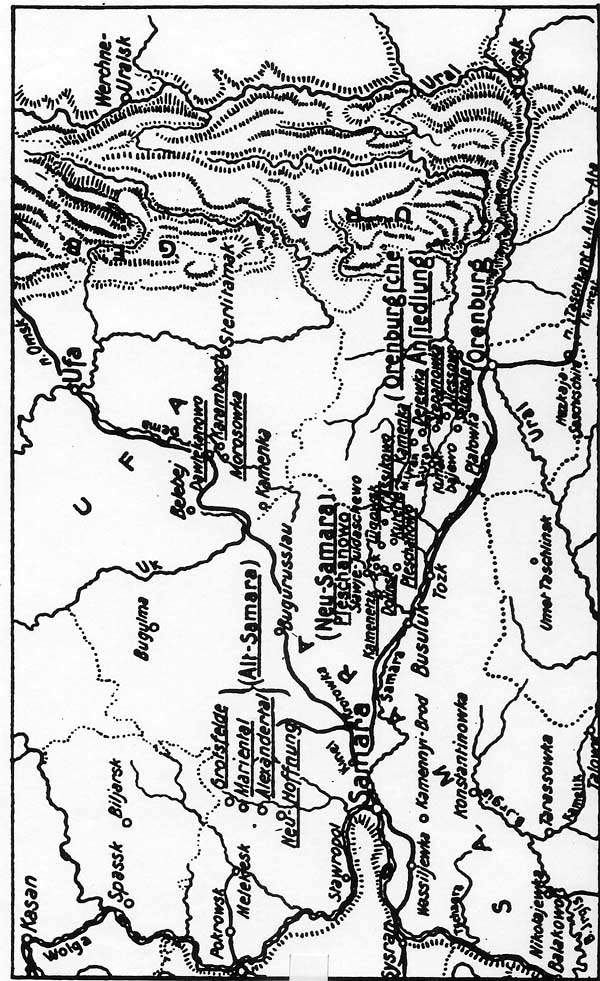
The Tartars also had a refreshing drink made from the fermented milk of mares called Kumys. Once given a task to do, the Tartars were not known to be reliable in completing it even though they initially agreed to do so. They helped on the farms with the women acting as nursemaids or 'kindermadchen' because all the sewing and cooking had to be done from scratch working for their food and gifts
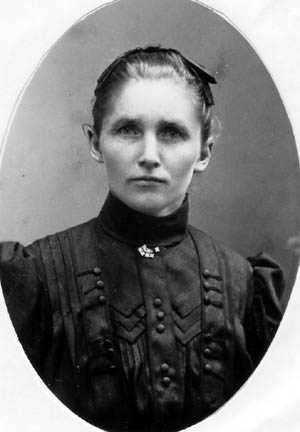 |
| Maria Eck Wiens |
Few things are known about Peter's father. He was born June 24, 1867 and died on April 28, 1909 at 43 years of age. A widower with one child, he married Maria Eck Wedel on September 24, 1898 with the birth of their first child Sara occurring in October of that year. Three other daughters followed - Justina, Margareta and Lena in 1901, 1903 and 1905. Sister Lena died in 1911. The one thing that we do know is that he donated the land for the first M.B. church in the area.
Peter's father died 1909 when he was just a year old. In January of 1909, his father was caught in a bad storm and the only way to find his way home was to use the ropes installed by the side of the road following them to certain points. With one hand holding onto the rope, he used the other to guide the sleigh and somehow got home. Unfortunately he became very ill.
This, turned into pneumonia which in turn led to tuberculosis that caused his death a few months later in April of the same year.
Maria married Peter Henrich Pauls, a bachelor on January 10, 1910. This union was blessed with four more children - Katarina (Tina), Hans, Mariachen, and Agnessa (Njessa). Hans and Mariachen died with days of each other in 1917 during a dysentery epidemic.
The Wiens-Pauls family was all musically talented with abilities that included violins, mandolins and guitars. When their neighbors, the Kornelius Siemens (Justina's parents-in-law) came over, they became one big choir.
They were a close knit family that involved everyone in the family in their activities - grandparents, aunts, uncles and kids. The Paul family played many games in their homes. One of these games was 'blinds men bluff'. The family would clear out the living room and have all the chairs stacked out of the way. Other forms of entertainment included reading books and making up their own games.
Almost all of the families in the colony were farmers. Their homes were situated in front by the road with their farms in the back. The children were included in running the farm at a very young age doing chores such as milking cows, gathering eggs etc. The family raised pigs, cows, chickens and horses. The book UFA has a map (see map on page 17) indicating where different people lived. It is presumed that the square marked 'Wedel' is the family that raised and adopted Maria.
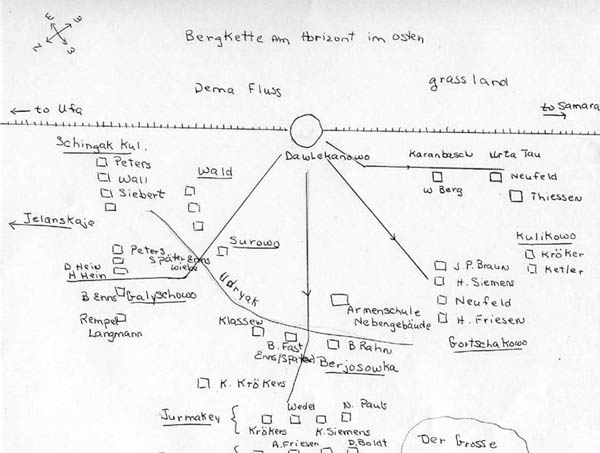
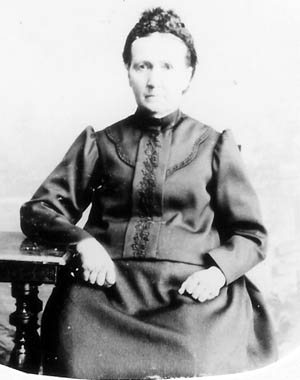 |
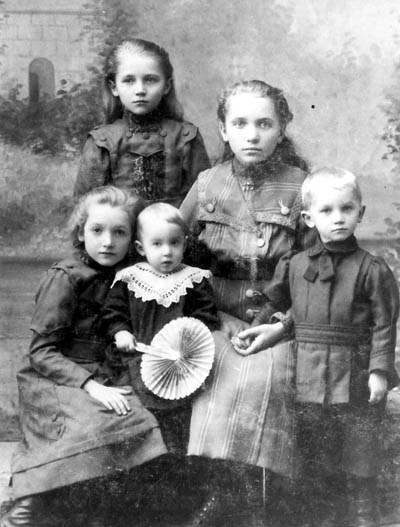 |
| Peter's Grandmother Maria Born Wiens |
The Wiens Children Back row: Justina, middle row: Sara, Front row: Margaret and Peter Little girl in front: identity is unknown |
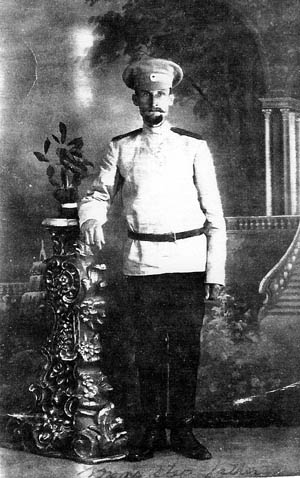 |
Peter's Stepfather Peter Henrich Pauls Disappeared Nov. 1937 |
As a young boy, Peter was quite strong willed. He did not like to hear the word 'no'. One incident that a relative relayed about him goes like this: Peter did not like to hear his mother say that certain two lettered word, NO about something - and proceeded to throw a royal fit.
There was a cradle in the room which was used for the newest baby. This cradle had sharp corners on it. When he couldn't have his own way, he threw himself onto the hardwood floor and bumped his head on a corner of the cradle splitting his head open. His mother fixed him as best as she could and asked him, "Well, Peter do you want to do that again"? One can only imagine what his answer was.
The Wiens-Pauls family did a lot of talking together. The theory that children should be seen and not heard was not adhered to. Children and their feelings were important to their parents and were encouraged to say what they thought around the table.
Their parents were people who loved the Lord greatly and took great pains to invest Christian values in their children, faithfully taking them to church each week. The church was some distance away from the home and in order to keep warm in the winter, straw was thrown on the bottom of the sleigh with blankets covering that. The children were tucked in the sleigh covered by more blankets and kept warm with the use of hot rocks and sad irons.
A standard greeting they may have heard their pastor use in greeting may have gone like this:
"I desire for this assembly the Peace of God which the world can neither given nor take away, which was established on Golgatha and which will not pass away though all else may vanish". This greeting is prophetic of everything that communism tried to do and failed.
Peter's parents were generous people - sharing what they had with those in need. Some of people that they helped daily with were the hungry beggars who came to their door daily at dusk. Everyday a large caldron of unpeeled potatoes was washed and cooked and handed to the beggars at the door.
They also had a room specially set aside to house them overnight. The following morning the straw mattress bags were taken out and clean straw put in so that no disease or lice would be passed onto the children or the next night visitors.
 Index IndexPage |
 Previous Previoussection |
Section 3 |  Next Nextsection |